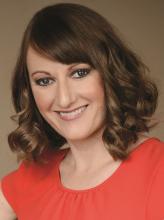Women in forensic psychiatry making progress but still have ways to go
REPORTING FROM THE AAPL ANNUAL MEETING
AUSTIN, TEX. – Women are making progress in equal representation and leadership within the field of forensic psychiatry, but gender parity remains elusive, according to a presentation at the annual meeting of the American Academy of Psychiatry and the Law.
In the presentation, Kelly L. Coffman, MD, MPH, assistant professor of psychiatry and associate program director of the forensic psychiatry fellowship at Emory University, Atlanta, and Helen M. Farrell, MD, a lecturer at Harvard Medical School, Boston, discussed gender bias in the field and in medicine at large.
After reviewing a handful of Supreme Court cases since the 1970s establishing women’s rights to equal opportunities and harassment-free workplaces, Dr. Farrell noted a recent commentary in the New England Journal of Medicine illustrating the challenges women still face. In that commentary, Reshma Jagsi, MD, a professor of radiation oncology at the University of Michigan, Ann Arbor, and director of the Center for Bioethics and Social Sciences in Medicine, shared her own #MeToo experience within the context of such harassment narratives throughout academic medicine (N Engl J Med. 2018;378:209-11).
Harassment found in medicine
Dr. Jagsi had published a study in 2016 on workplace sexual harassment in medicine that surveyed 1,066 recipients of career development grants from the National Institutes of Health (JAMA. 2016;315:2120-1). The average age of respondents was 43 years, and 46% of respondents were women.
While only 22% of men reported perceiving gender bias in their careers, 70% of women reported such bias. Similarly, 66% of women said they had experienced gender bias in their careers, compared with 10% of men (P less than .001). Women also were substantially more likely to have experienced sexual harassment (30% vs. 4%).
Most women (92%) reporting those experiences described sexist remarks or behavior, 41% experienced unwanted sexual advances, and 9% experienced coercive advances.
“Although a lower proportion reported these experiences than in a 1995 sample, the difference appears large given that the women began their careers after the proportion of female medical students exceeded 40%,” Dr. Jagsi and her colleagues reported in the study.
The effects of those experiences were not minor: Among women who reported harassment, 59% said their confidence as professionals took a hit, and 47% said those experiences hurt their career advancement.
Women still underrepresented
One factor in those high rates might be the extent of existing power differentials: Women remain underrepresented in medical leadership despite accounting for more than half of all enrollees in U.S. medical schools in 2017, according to the Association of American Medical Colleges (AAMC). Female enrollment in medical schools hovered around 40% in the mid-90s, yet in 2015, the AAMC reported that women held 37% of all U.S. medical school faculty positions and 20% of full professorships.
“There’s also a large discrepancy in terms of specialties,” said Dr. Farrell, also a staff psychiatrist at Beth Israel Deaconess Medical Center, Boston. “Women tend to go into fields like pediatrics and ob.gyn. at much higher rates than men, and there are very low rates of women going into surgical fields like neurosurgery and orthopedics.”
Dr. Farrell then zeroed in on the field of forensic psychiatry in particular and various ways to consider how gender bias might manifest: opportunities for exposure to forensics in residency; fellowship applications vs. acceptances; experience in court; publications; invitations to present; large- and small-scale organizational leadership representation; and job placement across the settings of clinics, academics, prisons/institutions; and experience in private practice. Then there’s the perception of female forensic psychiatrists in court.
“There’s a really big question about the difference between how men and women are perceived by attorneys who hire us as experts, and by judges and juries in terms of our credibility when we’re testifying,” Dr. Farrell said.
Picking up where Dr. Farrell left off, Dr. Coffman noted that women always have faced an uphill battle – particularly within forensic psychiatry.
“Forensic psychiatry really is the global intersection of medicine, the criminal justice system, and the law – and traditionally, all three of these fields have really been male dominated,” Dr. Coffman said. “We were often told that women should not go into careers like medicine and the law, because if they work too hard, they might ruin their reproductive potential. They were also thought of as being weak and unable to handle seeing blood.”
Fortunately, however, she added: “That’s very different from how we think about things today.” For example,







